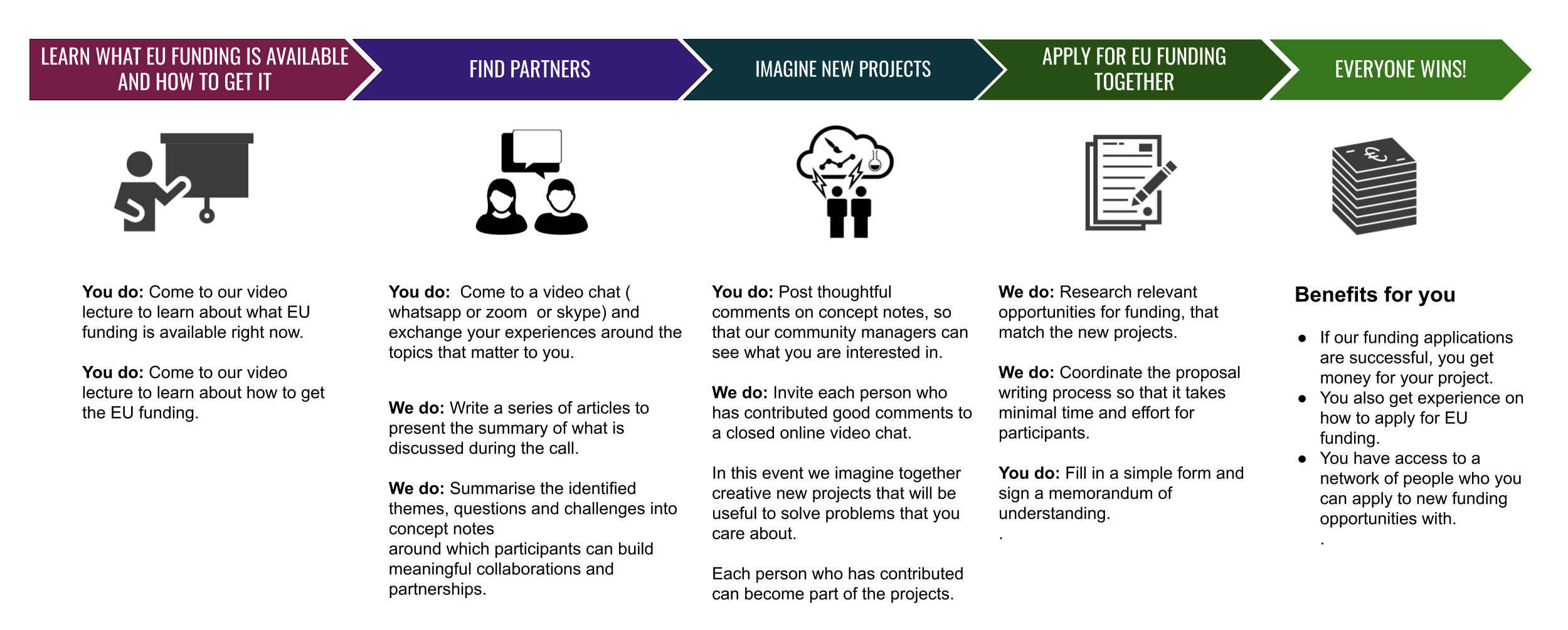With @nadia @noemi @IvanC @bojanbobic.
This is a wiki with notes, feel free to add/ change the notes.
About POPREBEL:
The challenge this year is to reach people who are curious with issues around which you can problematise and discuss strategies for dealing with problems, strategies of resistance.
We don’t categorize people based on their problems.
Bojan: Belgrade is very different than the rest of Serbia.
Nadia: Even in rural environments, you’re still going to find ambitious and curious people, but you need to go far enough to reach them.
Bojan: the example of a southern Serbian region where they are trying to produce green energy.
Others in the region - ‘Old Mountains’ also do things like producing their own honey.
Ivan: so what we want is to get to a structured narrative of how people are dealing with things, to capture that.
Nadia: What are the healthy parts of society?
Ivan: The groups that are fighting for some kinds of freedom - but many leave after a while. If you’re not talking about the minority that tries to change something, than the strategies are things like black humor,
Bojan: Also conviviality and doing some nice things for each other. But no one wants to go into confrontation if it’s not necessary.
Edgeryders engagement is amazing, but too Western. Balkan society - we enjoy so much to nag about things. The strategy works for people who already want to do things.
The political situation is very polarized: you can vote for the ruling party, but at least you know you’re taking cared of.
Nadia: Could a topic like green energy be the way to start?
Noemi: Getting to people who are far off is more expensive, needs more of an anthropological approach: sitting down and interviewing them, getting the stories and building the trust.
Otherwise the alternative is to reach the young entrepreneurial people in the early days of their journey, who are motivated to build new connections with others and/or internationally.
Nadia: in any context, ideally we would find a person committed to the community who has some trust of others and can bring people together.
Bojan: first build the list of contacts and find the person who can be a community leader:
-
who understands the value of our approach
-
who can help us figure out which kind of call and content is valuable for the people we want to engage in an online event/ exchange program
-
Ivan and Bojan can do that search - also looking at Brussels based organisations with connections in the Balkans who know the scene and organisations.
-
topics like: Belgrade under water (?), ecological issues, organisations in the ‘Old Mountain’ where there is already a committed group; or perhaps food, sustainable agriculture.
Note by Noemi: These topics are NOT different from the ones we signaled our: they fall under work/employment and the purpose of the conversations would be to understand the livelihoods of people working in this topic.
Process for local partners - could work for Poland, Czechia, Serbia as well:
- Identify the conversation with potential to change something in a local community (ie sustainable food)
- Local partners: could be people in the sector or working to get there. They understand the benefits of an international partner like ER and how to build a community for a strong outcome: apply for funding together.
- The partners do workshops, trainings, community activities
- The outcomes of the activities become a concept for a funding application with Edgeryders and Local partners, and other actors from the community who have contributed to the concept development through the conversation
Who does what:
The first thing is to build a list of organisations who can become local partners:
- for Poland @Wolha
- for Czechia @Jirka_Kocian
- for Serbia @bojanbobic @IvanC
Then build an invitation and visualisation for this process of going from Topic → Partnership → Community → Funding application
A series of online sessions on:
- What is going on in the food sector - with the partners, in EN (October), as part of the Edgeryders broader resilience summit
+++ Community Webinars: with partners and invited community members; could happen in different languages and hosted by partners - What is up and coming on a European level?
- Webinar explaining the process for how to apply to European funding: will be presented in the local languages (by Andreja and others in Brussels - someone at Catalyst Balkans or others proposed by Bojan - https://www.donacije.rs/)
+++ Specific steps involved in applying for EU funding from the perspective of the individual organisations
